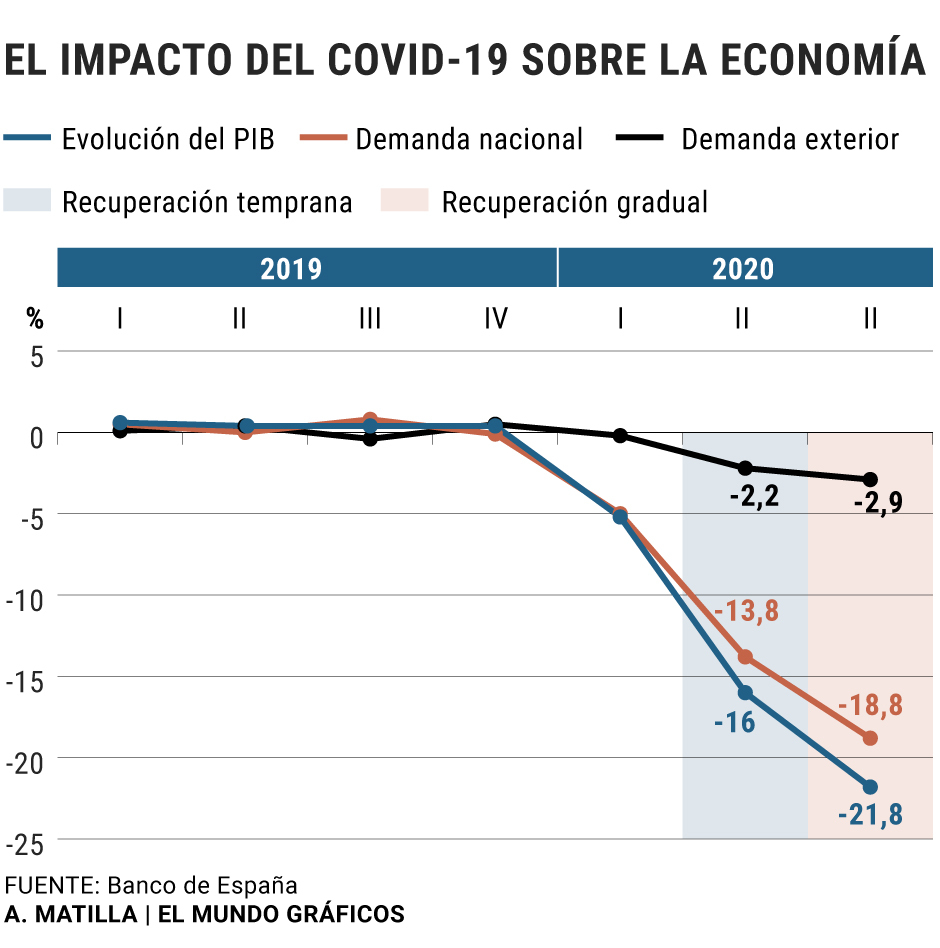- Coronavirus. The Bank of Spain shows Pedro Sánchez the real key to raising income: raising VAT
- Coronavirus.The IMF drastically worsens its forecasts for Spain and places it at the head of the global collapse
The Spanish economy is going to be one of the most affected worldwide by the crisis derived from the coronavirus pandemic. This has been shown by the OECD, the International Monetary Fund (IMF) or the Bank of Spain, the latter body which also highlights a key circumstance to understand such negative behavior: trade and hospitality are sectors with a very important weight in the economy as a whole and, at the same time, those who are suffering the most from the confinement and the situation that the Prime Minister, Pedro Sánchez, has defined as "new normality".
" The fall in activity in commerce, transport and hospitality was particularly severe in Italy and Spain -over 60% and 70%, respectively-, countries where, in addition, the weight of this activity in the economy is greater ", explains the BdE in its last quarterly report on the Spanish economy when comparing the impact of the crisis on the main European economies. And he adds: "Specifically, the hotel and restaurant business, which would have seen its activity almost completely interrupted, represents 3% of the GVA [gross added value] of the EMU, but in countries with greater importance for tourism, such as Italy or Spain, its weight rises to 4% and 6% of GAV, respectively. "
These data, continues the body led by Pablo Hernández de Cos, refer only "to the period of strict confinement in the first quarter", which in the case of Spain covers the last part of March. However, this perfect storm for the Spanish economy has continued in the following months.
"As a consequence of the containment measures, the economic activity is having a very heterogeneous evolution by branches during the second quarter. In particular, numerous activities related to the service branches (such as retail, leisure, catering and hospitality) ) generally require high interpersonal interaction, which is why they have also been particularly affected by social distancing measures, "he explains.
Up to 21% crash
As these are structural characteristics of the economy, which are also directly related and promoted by the importance of tourism, the BdE adds that "the containment measures adopted in Spain have been comparatively stricter", as well as that " the response of budgetary policy it has been somewhat less energetic than in economies where the room for maneuver was greater. "
This last point refers to the fact that the different governments did not make real efforts to contain the deficit and the debt in the boom years, a good example of which is that the Sánchez Executive not only did not reduce but also increased the budgetary deviation last year. . As a consequence, Spain has this smaller margin for action, which, added to the other factors, means that "the repercussion of the health crisis in the Spanish economy is being more intense than in the euro area as a whole ".
And the proof of this in figures is that, after the collapse of more than 5% of GDP in the first quarter, the BdE contemplates a setback of between 16% and 21.8%, between April and June.
According to the criteria of The Trust Project
Know more- Covid 19
- Coronavirus
- Crisis
SIGMA TWO SURVEY Half of Spanish workers fear going out of work
Crisis Coronavirus kills Blue Air flights to Bucharest
CoronavirusCalviño maintains that "the recovery has already begun" despite the biggest economic collapse in history
See links of interest
- Last News
- Programming
- English translator
- Work calendar
- Daily horoscope
- Santander League Ranking
- League calendar
- TV Movies
- Cut notes 2019
- Themes
- MoraBanc Andorra - Real Madrid
- Alavés - Osasuna
- Real Sociedad - Celta de Vigo, live
- Girona - Numancia
- Real Madrid - Mallorca, live

